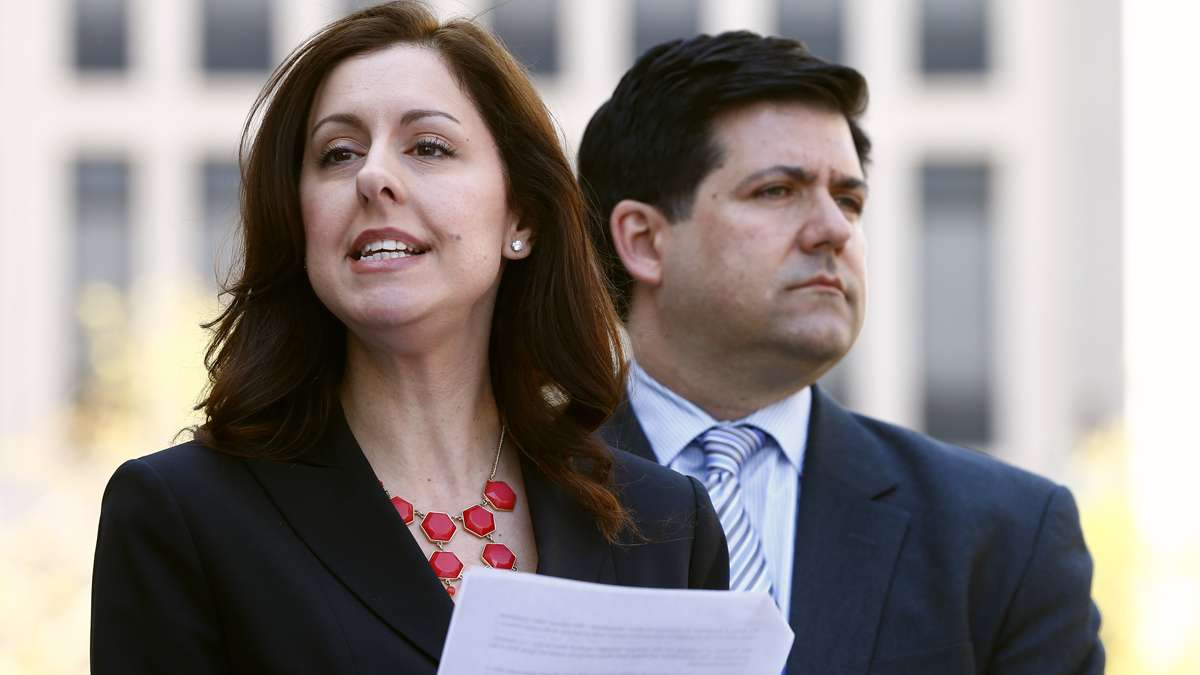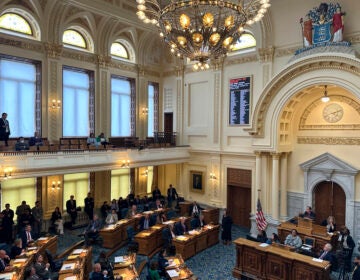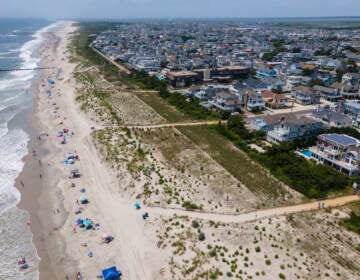Gov Christie cleared, feds indict 3 close allies
Federal prosecutors brought charges Friday against three former allies of Gov. Chris Christie — but not Christie himself — in the George Washington Bridge traffic scandal, apparently easing the legal threat that has hung over his 2016 White House ambitions for more than a year.
One of those charged, David Wildstein, a former high-ranking official at the transportation agency that operates the bridge, pleaded guilty in a deal with prosecutors, saying he and the other defendants engineered huge traffic jams to get even with a local politician.
Christie was not implicated in court or in the indictments.
“Based on the evidence currently available to us, we’re not going to charge anyone else in this scheme,” U.S. Attorney Paul Fishman said at a news conference.
The Republican governor claimed vindication.
“Today’s charges make clear that what I’ve said from day one is true — I had no knowledge or involvement in the planning or execution of this act,” Christie said in a statement.
While Christie may be out of any immediate legal danger, politically it could be more complicated. The furor has already damaged his standing in the polls, and the charges put the scandal back in the news just as the presidential cycle is getting underway and candidates are jumping into the race.
Wildstein, a former official at the Port Authority of New York and New Jersey, pleaded guilty to conspiracy, saying he and the other Christie loyalists closed lanes and created gridlock in September 2013 as political payback against a Democratic mayor. He said the three of them also concocted a cover story: It was a traffic study.
The two people he implicated — former Christie deputy chief of staff Bridget Kelly and Bill Baroni, who was the governor’s top appointee at the Port Authority — were charged with fraud, conspiracy and other offenses in an indictment unsealed later in the day.
Wildstein, 53, has been cooperating with prosecutors for months. He could face about two years in prison at sentencing Aug. 6. The charges against Kelly and Baroni carry much heavier penalties if they are convicted.
Essentially, the three defendants were accused of misusing public resources for political gain.
They “callously victimized” people who were “just trying to get to school or go to work,” Fishman said.
Wildstein gave no indication in court that Christie had any role in the scheme. But after the hearing, his lawyer, Alan Zegas, reiterated a claim he made last year that there’s evidence that Christie knew about it as it happened. He did not go into detail.
Brigid Harrison, a political science professor at New Jersey’s Montclair State University, said the charges are bad news for Christie.
“I would go so far as to say that this really signals a death knell to his presidential aspirations,” she said. “You have key staffers who have been indicted, and one of the things that primary voters look to is: How would a prospective president manage their staff?”
But Fergus Cullen, former chairman of the New Hampshire Republican Party, said he does not expect a major effect: “People have already made up their minds as to whether they think it’s a deal or not.”
Some Christie foes have suggested that even if he had no direct role in the plot, his bruising political style created a culture that led members of his administration to think they could get away with such tactics.
Asked about that, Fishman said: “I won’t comment on culture.”
State Assemblyman John Wisniewski, a Democrat who is co-chairman of a committee investigating the scandal, said that withWildstein’s guilty plea, “the people of New Jersey have more reason to be skeptical of Gov. Christie’s leadership style built upon bullying and retaliation.”
Baroni’s lawyer, Michael Baldassare, said that Baroni will be fully exonerated and that Wildstein is a habitual liar.
Kelly emphatically denied any wrongdoing and said she will work relentlessly to clear her name. “I never ordered or conspired withDavid Wildstein to close or realign lanes of the bridge for any reason, much less for retribution,” she said.
She also said that she texted and emailed things that she meant to be funny — but now sees that they were not.
The scandal broke wide open more than a year ago when an email from Kelly to Wildstein was revealed. It read, “Time for some traffic problems in Fort Lee.” Wildstein’s reply: “Got it.” That exchange was key in the indictment.
The closing of two of three access lanes caused monumental, bumper-to-bumper tie-ups at the George Washington Bridge, which links New Jersey to New York City and is the busiest span in the world. School buses and emergency vehicles were held up, and commuters were stuck in traffic for hours over four mornings.
Wildstein said they orchestrated the lane closings to start on the first day of school to punish Fort Lee Mayor Mark Sokolich for not endorsing Christie’s re-election bid. Fort Lee sits at the foot of the bridge.
Christie has called the scheme “stupid” and ridiculed the notion that he was even interested in an endorsement from Sokolich. The governor coasted to re-election in the fall of 2013.
On Friday, Sokolich said the allegations that he was the target of political retribution were “a true punch in the gut.”
“I didn’t sign up for this,” he said. “I signed up to open up Little League fields and lower taxes.”
As the scandal unfolded more than a year ago, Wildstein and Baroni resigned, and the governor fired Kelly and cut ties with Bill Stepien, his two-time campaign manager. Stepien was not indicted.
The timelline
Following is a timeline in the events surrounding the September 2013 closure of lanes leading to the George Washington Bridge and its fallout:
Sept. 16, 2010: Fort Lee, New Jersey, Mayor Mark Sokolich meets with Port Authority of New York and New Jersey Deputy Executive Director Bill Baroni to discuss traffic problems related to the George Washington Bridge, one of the world’s busiest spans.
Nov. 9, 2010: In a letter to Baroni, Sokolich details his town’s traffic problems and asks for more help from the Port Authority to direct traffic in Fort Lee amid gridlock. He notes that problems worsen when some toll lanes are shut down on weekends.
Spring 2013: Christie re-election campaign asks Sokolich, a Democrat, to consider endorsing the Republican governor. Sokolich says he never told Christie’s campaign yes or no.
Aug. 13, 2013: Bridget Kelly, then Christie’s deputy chief of staff, emails Christie ally David Wildstein, director of interstate projects at the Port Authority. Kelly writes: “Time for some traffic problems in Fort Lee.” Wildstein responds: “Got it.”
Sept. 9, 2013: Instead of the usual three approach lanes to the bridge from Fort Lee, commuters find only one that morning. Four days of traffic gridlock ensues.
Sept. 13, 2013: Port Authority Executive Director Patrick Foye orders the approach lanes be reopened, writing in a memo: “I believe this hasty and ill-advised decision violates federal law and the law of both states.”
Nov. 5, 2013: Christie is re-elected governor.
Nov. 25, 2013: Baroni appears before the New Jersey Assembly Transportation Committee, which had begun an investigation, and apologizes for what he acknowledges is the agency’s failure to communicate to local officials about the gridlock.
Dec. 6, 2013: Wildstein’s resignation is announced, effective Jan. 1, 2014.
Dec. 9, 2013: When asked about the lane closures at a news conference, Christie jokes, “Unbeknownst to everybody, I was actually the guy out there. I was in overalls and a hat. I actually was the guy working the cones.”
Dec. 13, 2013: Christie denies the lane closures were politically motivated and criticizes Democrats for exploiting the closures and “all the other politics swirling around it.” He announces Baroni’s resignation and says Wildstein’s resignation would be effective that day.
Jan. 8, 2014: Media outlets report on email and text message exchanges between Wildstein and Kelly, including the incriminating “time for some traffic problems” communication.
Jan. 9, 2014: Christie holds a nearly two-hour news conference in which he apologizes for the lane closures but denies any knowledge of them or a cover-up, saying he is “embarrassed and humiliated.” He announces Kelly has been fired “because she lied” and that he is cutting ties with his former campaign manager, Bill Stepien. Meanwhile, U.S. Attorney Paul Fishman announces he will investigate whether any laws were broken. Also, six residents file a federal lawsuit against Christie, the state and the Port Authority alleging they were harmed by the traffic jams. The same day, a judge rules that Wildstein must appear before lawmakers who issued a subpoena; he appears later that day but invokes his right not to incriminate himself and refuses to answer any of the lawmakers’ questions.
March 27, 2014: Randy Mastro, a lawyer retained by Christie’s office, releases a report that finds Christie and his remaining top staffers did nothing wrong regarding Fort Lee traffic and the bridge. Democrats blast it as political propaganda.
March 28, 2014: Port Authority Chairman David Samson, a Christie appointee, announces his resignation from the board. His lawyer later says he will no longer cooperate with the lawmakers’ inquest citing privacy concerns and his right not to incriminate himself.
April 9, 2014: A judge rules that Kelly and Stepien can invoke their right not to self-incriminate to avoid complying with the lawmakers’ subpoena to provide documents.
May-July, 2014: Five Christie aides appear before the special joint legislative committee investigating the bridge scandal.
July 16, 2014: Assemblyman John Wisniewski, the committee co-chairman, says several people on its list of potential witnesses are off limits because they could also be important to the federal criminal investigation.
Dec. 5, 2014: The legislative committee releases an interim report by its lawyer, Reid Schar. The report does not link Christie to the lane closures, but it also notes that the committee did not have access to several key witnesses. The report blasts Christie’s office for responding “slowly and passively” as it became apparent that the lane closures were created for political reasons. The report said that “lack of curiosity” could have been “because they knew or suspected a more damaging true story and preferred that it not come to light.” But the report stopped short of accusing the office of engaging in a cover-up. Christie’s supporters blast the report as politically motivated.
Dec. 27, 2014: Christie and New York Gov. Andrew Cuomo both veto legislation intended to overhaul the Port Authority. Instead, they release a new set of recommendations for the agency.
Jan. 23, 2015: Christie launches Leadership Matters for America, a political action committee that allows staff to be hired and money to be raised as he considers seeking the Republican nomination for president in 2016.
May 1, 2015: Wildstein pleads guilty to helping to engineer the traffic jams and implicates Kelly and Baroni, who are also charged. Kelly and Baroni say they are innocent.
___
Associated Press reporters Geoff Mulvihill in Trenton, Connie Cass in McLean, Virginia, and Kathleen Ronayne in New Hampshire contributed to this article.
WHYY is your source for fact-based, in-depth journalism and information. As a nonprofit organization, we rely on financial support from readers like you. Please give today.











